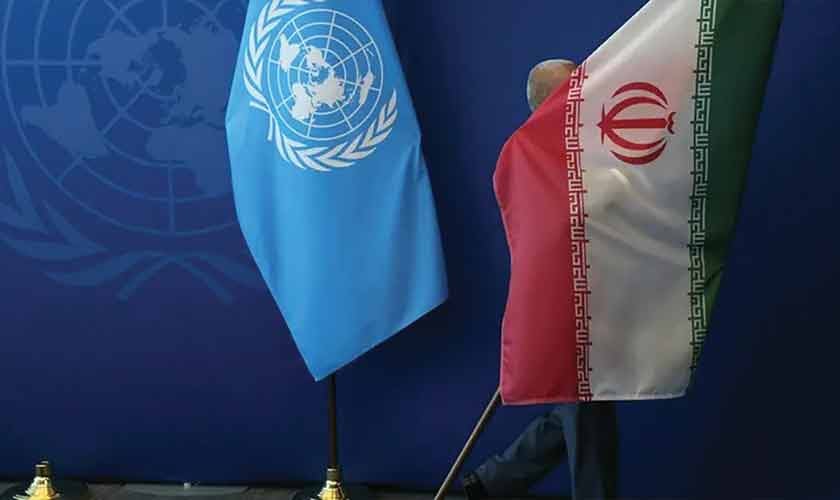The reimposition of UN sanctions on Iran, initially imposed by the Security Council between 2006 and 2010, reflects the continued determination of the US-led West to subject Iran’s nuclear programme to arbitrary controls that go far beyond the requirements of the nuclear Non-Proliferation Treaty (NPT).
These sanctions, along with others imposed by the US, are ostensibly aimed at nuclear non-proliferation. However, their true purpose appears to be overcoming Iranian opposition to Western hegemony in the Middle East, maintaining Western control over the region’s vast energy resources, securing vital international trade routes, and ensuring the security of Israel — which effectively acts as the United States’ military outpost in the Middle East.
The double standards followed by Western countries in dealing with nuclear non-proliferation are apparent. For instance, most Western nations turned a blind eye when Israel, which is not a signatory to the NPT, embarked on its nuclear weapons programme. Countries like France and the UK directly or indirectly aided Israel, while the US tacitly accepted Israel’s acquisition of nuclear weapons. As a result, Israel is widely believed to possess over 80 nuclear warheads.
Regarding Iran, historical records show that during the reign of the Shah — a US ally — negotiations took place between the US and Iran to allow Iran to receive US nuclear technology. In 1975, President Ford approved a policy decision permitting the use of US materials and equipment in Iran’s nuclear programme, including the provision of a full nuclear fuel cycle. This would have included plutonium reprocessing and uranium enrichment facilities under safeguards as permitted by the NPT.
However, the US position changed radically after the Islamic Revolution in 1979, which interrupted the planned sale of US reprocessing and enrichment plants to Iran. The main reasons for denying these technologies were the growing animosity between the two countries—especially after the 1979 hostage crisis—the Iranian revolutionary government’s commitment to the Palestinian cause, and its resistance to American hegemony in the Middle East.
The discovery of clandestine Iranian uranium conversion and enrichment facilities at Isfahan and Natanz in 2002 led to Western pressure on Iran, prompting UN Security Council resolutions demanding Iran suspend uranium enrichment. Iran’s refusal to comply resulted in a series of UNSC sanctions imposed between 2006 and 2010.
In July 2015, Iran and the P5+1 (the five permanent UN Security Council members plus Germany and the European Union) signed the Joint Comprehensive Plan of Action (JCPOA). The agreement placed Iran’s nuclear programme under several restrictions to ensure its peaceful nature, in exchange for relief from international sanctions.
However, the reimposition of UNSC sanctions on Iran threatens to further weaken its economy and may destabilise the country internally. In May 2018, President Trump announced the US withdrawal from the JCPOA, citing concerns over the deal’s sunset clauses and insufficient restrictions on Iran’s ballistic missile programme. He also signed an order reinstating US nuclear sanctions on Iran that had been waived under the deal.
In response to the US withdrawal, Iran gradually reduced its compliance by exceeding agreed limits on its enriched uranium stockpile and enrichment levels, and by installing advanced centrifuges for uranium enrichment. Subsequent talks between Iran, the US, and the EU failed to resolve core issues.
Following President Trump’s re-election, additional attempts by the US and the E3 (Britain, France, and Germany) sought a mutually satisfactory settlement. These efforts failed, primarily due to the US insistence that Iran abandon uranium enrichment altogether. This impasse culminated in Israeli and American airstrikes on June 13 and June 22, respectively, causing extensive damage to Iran’s nuclear facilities—particularly the underground uranium enrichment sites at Natanz and Fordow.
Against this backdrop, the European powers triggered the “snapback” mechanism roughly a month ago, leading to the reimposition of UNSC sanctions on Iran, which had previously been lifted under the JCPOA. The Europeans accused Iran of failing to comply with its obligations under the nuclear deal.
A resolution introduced by China and Russia to delay the sanctions reimposition for six months, allowing more time for diplomacy, failed to gain the necessary support in the Security Council due to opposition from the US and European powers. Pakistan and Algeria voted in favor of the Sino-Russian resolution.
The sanctions, which came into effect on September 28, include an arms embargo, asset freezes, travel bans, and prohibitions on the transfer of sensitive nuclear and missile technologies to Iran. Russia has condemned the sanctions as unlawful, while Iran has warned of a harsh response.
The renewed UNSC sanctions are likely to further strain Iran’s economy and may provoke internal instability. Externally, increased Western pressure might drive Iran closer to political, security, and economic cooperation with China and Russia. Alternatively, if pragmatic diplomacy prevails, Iran could seek closer, friendly relations with neighboring countries like Pakistan, Turkiye, and the Gulf Cooperation Council (GCC) nations to foster a more secure regional environment.
At the global level, the treatment of Iran sends a stark message: the world is moving towards an era where power supersedes international law and morality, pushing the United Nations to the sidelines in dealing with major issues of war and peace.
https://www.thenews.com.pk/tns/detail/1348317-iran-and-the-western-double-standards
